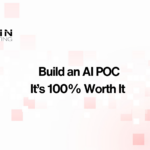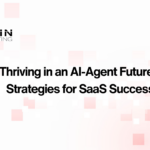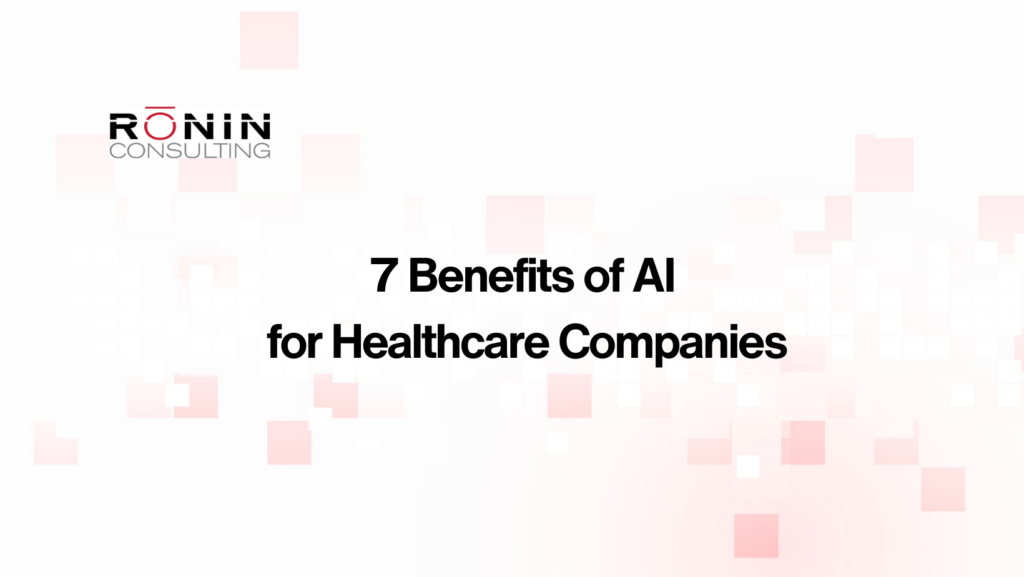
7 Benefits of AI in Healthcare
Healthcare companies face mounting challenges, including rising costs, inefficiencies, and critical labor shortages. A recent study by Mercer projects a shortfall of over 100,000 healthcare workers by 2028, compounding the strain on an already overstressed system.
This workforce decline, combined with the increasing demand for care from an aging baby boomer population and the impending retirement of many experienced nurses, highlights a healthcare system teetering on the edge of a crisis. However, Artificial Intelligence (AI) offers a promising solution to these challenges.
Artificial intelligence is transforming healthcare by tackling these challenges head-on. AI solutions streamline operations, improve patient outcomes, and enable smarter, more efficient healthcare systems. By leveraging AI in healthcare, the industry is redefining its future and finding innovative ways to navigate this challenging landscape.
What is AI in the context of healthcare?
AI in healthcare refers to the application of advanced algorithms, machine learning models, and technologies designed to mimic human intelligence in processing, analyzing, and interpreting medical-related data. AI systems can analyze vast amounts of information at unprecedented speeds, identifying patterns and insights that would take humans significantly longer to uncover—or might be missed entirely.
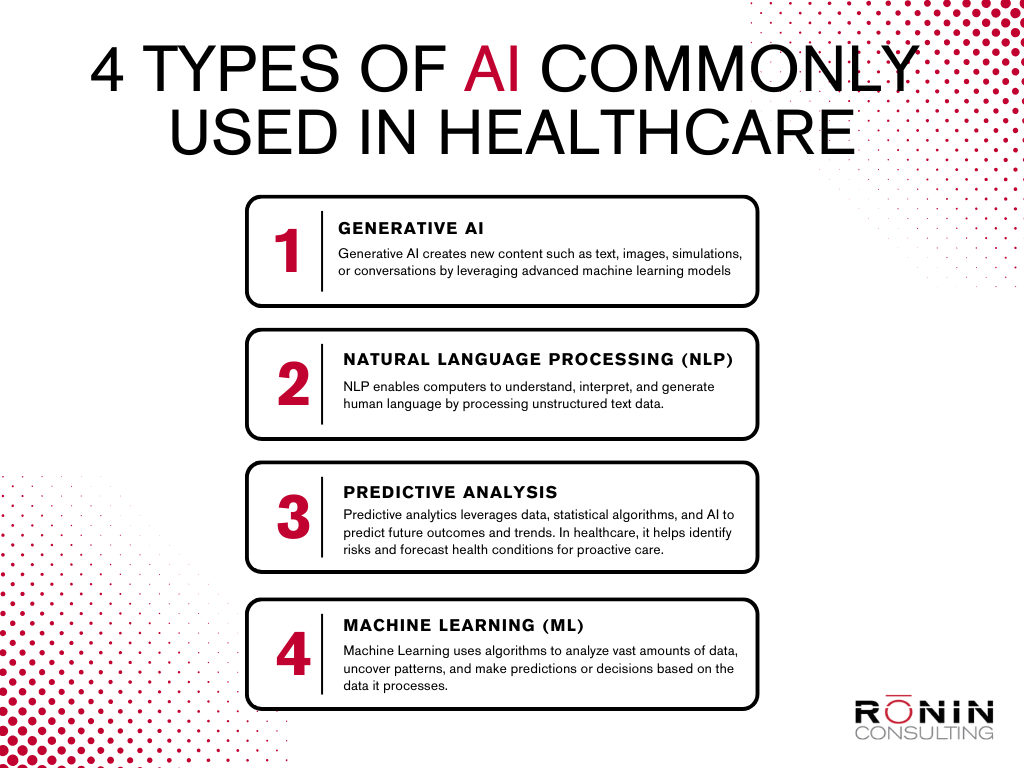
4 Types of AI commonly used in healthcare
Generative AI
Generative AI creates new content such as text, images, simulations, or conversations by leveraging advanced machine learning models.
Healthcare Example: A generative AI-powered virtual assistant, such as Communication and Response Education, CARE, supports nursing students by simulating challenging patient interactions. CARE helps students practice managing difficult patients and high-stress situations in a safe, controlled environment, improving their confidence and problem-solving skills before entering real-world healthcare settings.
Natural Language Processing (NLP)
NLP enables computers to understand, interpret, and generate human language by processing unstructured text data.
Healthcare example: NLP systems can scan unstructured physician notes in EHRs to identify undiagnosed conditions, such as early signs of diabetes or hypertension, and flag them for follow-up care.
Predictive Analytics
Predictive analytics leverages data, statistical algorithms, and AI to predict future outcomes and trends. In healthcare, it helps identify risks and forecast health conditions for proactive care.
Healthcare example: A predictive analytics tool forecasts the likelihood of an influenza outbreak by analyzing historical health data, weather patterns, and population movements, helping hospitals prepare for surges in patient volume.
Machine Learning (ML)
Machine Learning uses algorithms to analyze vast amounts of data, uncover patterns, and make predictions or decisions based on the data it processes.
Healthcare example: Predicting patient readmission risks by analyzing electronic health records (EHRs), lab results, and demographic data to support clinicians in creating targeted care plans.
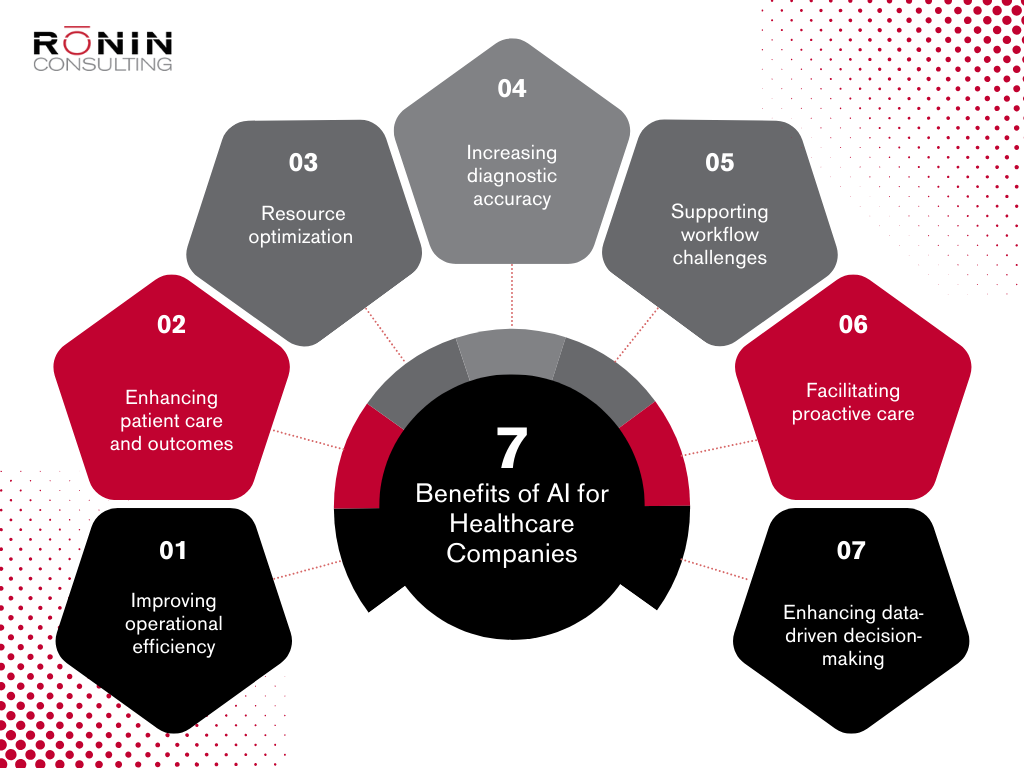
Benefits of AI for Healthcare Companies
From optimizing operational workflows to enhancing patient outcomes, AI empowers healthcare companies to deliver more efficient, effective, personalized care. Here are seven key benefits of integrating AI into healthcare systems:
1.) Improving operational efficiency
2.) Enhancing patient care and outcomes
3.) Resource optimization
4.) Increasing diagnostic accuracy
5.) Supporting workforce challenges
6.) Facilitating proactive care
7.) Enhancing data-driven decision-making
Improving operational efficiency
AI streamlines labor-intensive administrative processes like medical billing, appointment scheduling, and preauthorization workflows, allowing healthcare providers to focus on delivering patient care. Tools like Ronin’s precertification solution can minimize documentation errors, speed up approvals, and improve supply chain management. By automating repetitive tasks and augmenting decision-making processes, AI goes far beyond traditional automation to deliver transformative improvements in efficiency. Unlike traditional software development, which follows predefined rules, AI-powered solutions adapt and learn from data, allowing them to handle nuanced scenarios and make predictive recommendations.
Enhancing patient care and outcomes
AI enables personalized medicine by leveraging predictive analytics to create tailored treatment plans that improve patient outcomes. For instance, AI algorithms can evaluate a patient’s genetic information, medical history, and lifestyle factors to recommend precise therapies, such as selecting the most effective cancer treatment or optimizing medication dosages for chronic conditions. Virtual health assistants further enhance patient care by providing 24/7 support, reminders, and advice, empowering patients to take control of their health and stay engaged in their care journey.
Resource optimization
AI empowers healthcare providers to make the most of their resources by improving patient care workflows and prioritizing critical interventions. For example, AI-driven algorithms can identify patients at high risk for complications, enabling targeted, proactive care where it is needed most. Additionally, AI enhances supply chain management, minimizing waste while ensuring necessary supplies are available. These resource optimizations ultimately streamline operations, allowing providers to maintain high-quality care standards.
Increasing diagnostic accuracy
AI-powered diagnostic tools analyze medical images, lab results, and pathology data with remarkable precision, helping clinicians identify diseases faster and more accurately than ever before. For example, AI can detect minute abnormalities in radiology scans that human eyes might overlook, enabling early and precise diagnoses. These tools improve diagnostic accuracy and provide doctors with decision-support insights that enhance confidence and speed in treatment planning.
Supporting workforce challenges
AI addresses critical workforce shortages by automating routine tasks and providing tools that enhance productivity. For instance, virtual assistants can transcribe clinical notes or prepare patient documentation, significantly reducing the administrative burden on healthcare staff. AI also supports training and professional development by offering real-time feedback and simulations for healthcare professionals, equipping them to manage complex situations more effectively.
Facilitating proactive care
AI-powered predictive analytics allows healthcare providers to anticipate patient risks and intervene before issues escalate. AI systems can monitor chronic disease patients in real-time, alerting providers to potential complications and enabling early interventions. This proactive approach improves patient health outcomes, reduces emergency room visits, and enhances overall care quality, especially for populations with high healthcare needs.
Enhancing data-driven decision-making
AI transforms the vast amounts of patient and operational data collected by healthcare organizations into actionable insights. Decision-makers can leverage AI tools to identify trends, predict resource needs, and optimize treatment protocols. AI allows organizations to improve patient care strategies and operational planning with precision and foresight that traditional data analysis methods cannot achieve.
Challenges in AI adoption for companies
While AI offers transformative potential for healthcare, several challenges stand in the way of widespread adoption. Ensuring regulatory compliance, such as meeting HIPAA standards and safeguarding data privacy, remains a primary concern. Also, integrating AI solutions often demands significant financial investment and advanced technical expertise, creating barriers for many organizations.
Staff and leadership’s fear and resistance to change can slow down adoption, making effective change management a critical component of successful AI implementation.
AI in healthcare: 7 steps to AI adoption
Adopting AI in healthcare requires a strategic approach to overcome challenges and ensure successful implementation. Here are key steps healthcare companies can take to integrate AI effectively:
Identify areas of need
Begin by evaluating existing pain points within your organization where AI can make a meaningful impact. Focus on areas such as operational inefficiencies, diagnostic challenges, or resource optimization, ensuring AI adoption aligns with your overall goals and delivers measurable ROI.
Ensure data readiness
Before implementing AI, ensure your data is clean, organized, and compliant with privacy regulations like HIPAA. Proper data preparation, including preprocessing and securing patient information, lays the foundation for effective AI integration.
Build a cross-functional team
Assemble a diverse team comprising IT experts, clinicians, and administrators to oversee the AI adoption process. This team ensures alignment between technical capabilities and clinical needs, facilitating smoother transitions and better adoption outcomes.
Partner with technology providers
Collaborate with trusted experts like Rōnin to access scalable, tailored AI solutions that address your organization’s specific needs. Technology providers bring deep expertise and proven methodologies to ensure a successful outcome for your AI implementation.
Train and educate staff
Address resistance to change by educating staff and leadership about the benefits and capabilities of AI. Offer hands-on training to help teams feel confident using AI tools and understanding their value in enhancing care delivery.
Start small and scale up
Implement AI in pilot programs within specific departments or processes to test effectiveness and refine workflows. Once successful, scale up adoption across the organization, leveraging insights gained from initial rollouts.
Monitor and evaluate performance
Continuously track the performance of AI tools to measure their effectiveness in meeting your objectives. Use key performance indicators (KPIs) to assess success and identify areas for improvement, ensuring AI remains a valuable, long-term asset.
These steps can help healthcare companies navigate the complexities of AI adoption, maximizing its benefits while minimizing risks. With the right approach, AI can become a powerful driver of innovation and efficiency in healthcare.
The future of AI in healthcare
As healthcare companies face unprecedented challenges, AI adoption offers a transformative path forward. By streamlining operations, enhancing patient care, and improving decision-making, AI equips organizations to meet rising demands while maintaining quality and efficiency. Despite the hurdles of regulatory compliance, financial investment, and cultural resistance, healthcare providers can successfully navigate these challenges with a strategic approach and the right partnerships.
The future of healthcare lies in leveraging AI to not only address current pain points but also to reimagine how care is delivered. Organizations that embrace this innovation stand to achieve improved outcomes, optimized resources, and a stronger connection with patients. Now is the time for healthcare leaders to prioritize AI adoption and position their organizations at the forefront of a smarter, more sustainable healthcare system.
To learn more about how AI can transform your healthcare organization and take the first steps toward adoption, reach out to our team at Rōnin Consulting. Our experts are here to guide you through the process with tailored solutions and actionable strategies. Schedule a consultation and start your journey to smarter healthcare now!

